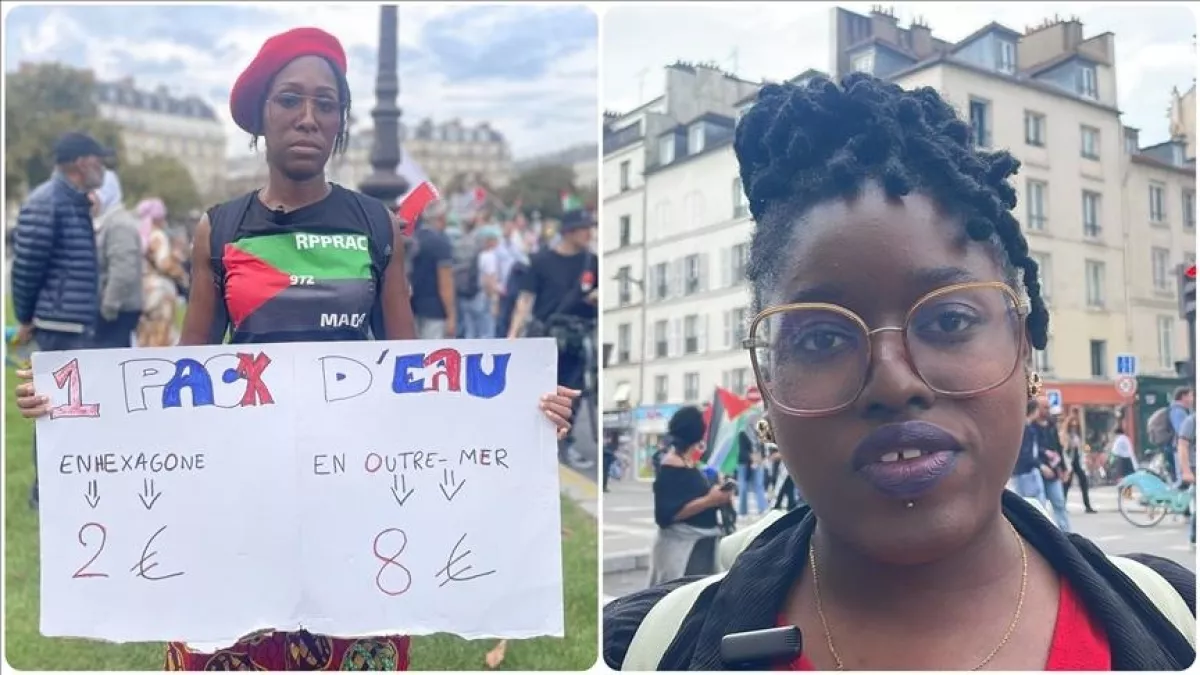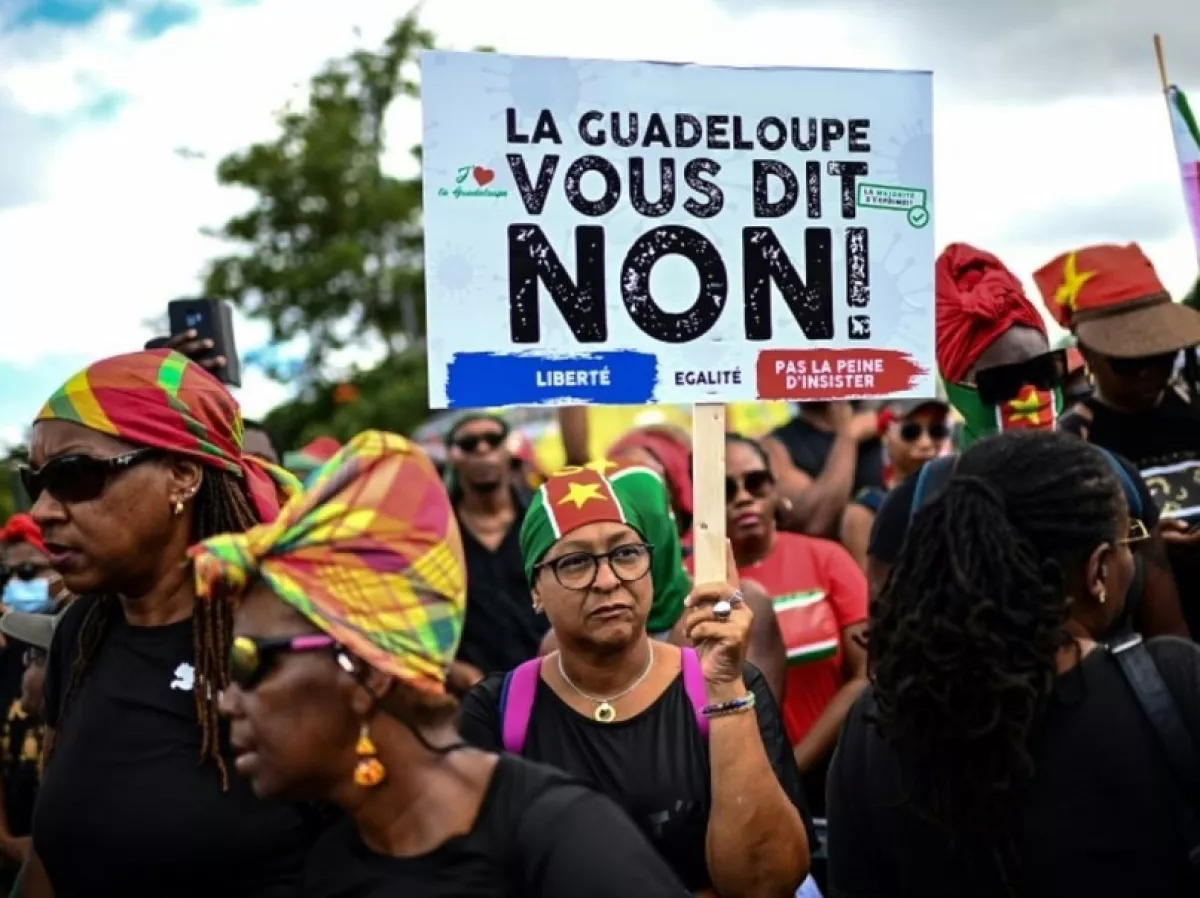Martinique and Guadeloupe say "no!" to Paris Voices of Resistance
It appears that difficult times have arrived for the former French Empire. Following the unrest in New Caledonia, social protests have erupted in Martinique, Réunion, and Guadeloupe.
Soaring prices and fiery protests
In Martinique, demonstrations against the high cost of living continue unabated. Last weekend, the "Republican Security Forces" (CRS8), an elite unit from the mainland notorious for their brutality, were deployed to the Caribbean island. Authorities withdrew these teams from Martinique in 1960 after three young people were killed by the special forces. The last time these units were active in the Caribbean was in 2009, during similar unrest in Guadeloupe. In four municipalities in Martinique, officials banned public gatherings and imposed a curfew last weekend, but despite these measures, protests persisted.
The unrest began on September 1, when the "Union for the Protection of Afro-Caribbean Peoples and Resources" (RPPRAC) organized a march featuring participants chanting "Stop the Prices!" to the rhythm of drums. The reality is that food prices in this overseas territory are up to 42% higher than in mainland France. In contrast, around 27% of Martinique’s population lives below the poverty line, compared to about 15% in France. Additionally, prices in Martinique have been steadily rising, averaging a 2% increase each year.
Protests against the high cost of living in Martinique have persisted throughout September. Demonstrators have blocked hypermarkets and attempted to shut down the highway connecting the island's northern and southern regions. As authorities have largely ignored the protesters' demands, some actions have taken on a more radical character. As is often the case, marginalized individuals have also joined the protests.
In a region where nearly one in three residents lives in poverty, the level of criminal activity is quite high. Since the beginning of 2024, 12 people have died from gunshot wounds. During the current unrest in the Fort-de-France municipality, 12 vehicles were set on fire, and 17 businesses were attacked. Restrictions on the sale of alcohol, fireworks, and even gasoline have failed to alleviate tensions.
The situation has escalated to the use of firearms. Initially, unknown assailants fired upon a police station, fortunately causing no casualties. However, as of today, 11 law enforcement officers have sustained gunshot wounds (it is unclear whether these were from firearms or air guns). In just one night, six police officers were injured in the legs, and three demonstrators were also wounded, one of whom was shot.
Professional organizations are also becoming involved in the standoff. Responding to a call from the "Union for the Protection of Afro-Caribbean Peoples," transportation operators have decided to hold their own demonstrations using large trucks. On September 24, police were forced to block all entrances to Fort-de-France to prevent convoys of truck drivers from driving demonstratively through the streets.

On the same day, clashes occurred at François Mitterrand Square, where police deployed tear gas against both demonstrators and bystanders. It should be noted that activists have attempted to address the rising cost of living through legal avenues. Back in July, the "Union for the Protection of Afro-Caribbean Peoples and Resources" filed a lawsuit to compel retailers to halt price increases. However, their efforts have yet to yield any results.
Port charges, oil monopoly
What is driving the high cost of living in France's overseas territories? This issue affects not just Martinique but almost all former colonies. A significant factor is the so-called "dock fee." This de facto customs duty is applied to goods imported to the island. In theory, this tax is intended to protect local producers from external competition, but in practice, even products that are not manufactured in Martinique are subject to this levy. According to some estimates, this "fee" raises prices for consumers by 6-22%. However, authorities have paid little attention to the issue, as port charges contribute up to 32% of the budgets of local municipalities.
The islands' remote and isolated locations are exploited by local monopolies. For instance, the price of premium fuel in Martinique is 13% higher than in mainland France. Experts attribute this to the pricing policies of the region's only oil refinery, which serves the French Caribbean and Guyana.
There is also a belief that the high prices are driven by substantial allowances of 20 to 40% received by local government officials. However, this assumption remains a contentious issue.
It is clear that the rising cost of living is an objective consequence of the neoliberal model of capitalism prevalent in France. In the metropolitan area, prices have increased by 1.8% over the past year, while in Martinique, the rise has been as high as 2.5%.
“Because we are not racists…”
Comments from ordinary mainland French citizens regarding the events in Martinique reveal a wide range of opinions. Unfortunately, many of them are still burdened by colonial thinking and racial prejudices. "Martinicans should get up in the morning and go to work to earn a living. They’re always complaining about rising prices, or they’ll break everything… Let’s allow them to manage this chaos themselves without giving them anything… Because we are not racists,” say some.
“Could we finally, as the English did long ago, grant independence to this detritus of the empire and immediately stop subsidizing them? A visit to a former British colony like Barbados or Saint Lucia highlights the difference: the residents of these islands, who are forced to work, warmly welcome tourists who provide them with a livelihood, while our Martinique and other subsidized Guadeloupes spit in our faces…” argue others.
There are also conspiracy theories suggesting that after a brief period of independence—something that the recently active social movements may achieve—the former colonies could fall under the influence of other Western powers.
Additionally, some argue that the crisis unfolding under President Macron, including in the overseas territories, is a genuine disaster. However, voices in support of the independence of Martinique and other French colonies are also being heard. Some participants in the discussion express scepticism, arguing that there is almost no industry there and that this Caribbean island primarily survives on tourism. Yet, no one questions why, after nearly 400 years of French dominance in Martinique, no serious industry has been established and why the economies of the overseas territories have not developed independently and robustly.
High cost of living
In response to the unrest, French authorities are not only deploying police special forces but also taking measures to navigate the situation. To alleviate social tensions, the Martinique prefecture has attempted twice to organize "round table" discussions involving government bodies, commercial companies, and civic associations. However, on both occasions, on September 5 and 12, the delegation from the "Union for the Protection of Afro-Caribbean Peoples" left the talks immediately. The reason was the authorities' refusal to broadcast the negotiations live. For the activists, this is non-negotiable—there must be no behind-the-scenes discussions; everything should be transparent.
A third "round table" is scheduled for September 26; this time, took place outside the prefecture, with the formal part of the meeting broadcast live and the working discussions recorded.
The General Confederation of Labor of Martinique (CGTM), with the support of energy and fire unions, has announced plans to hold a 24-hour general strike in the near future, including in the public sector. The CGTM has called for government regulation of prices on essential goods, indexing wages and pensions in accordance with inflation, and an end to repression against activists.
On September 26, despite heavy tropical rain, unions organized a large demonstration in Fort-de-France, where participants also voted in favour of a strike. Some municipal workers began striking that day. However, the anticipated strike at Martinique Airport did not take place.
In addition to Martinique, unrest and protests have erupted in Réunion and Guadeloupe. In Réunion, an inter-union association scheduled a general strike for October 1. Mass protests and strikes had already swept through these overseas territories in 2009, when up to 52% of Réunion's population lived below the poverty line.
Guadeloupe also experienced renewed unrest over the past weekend, marked by the use of Molotov cocktails. On September 25, the Guadeloupe Energy Union effectively initiated a strike and widespread power outages, citing the need for "technical work."
On September 26, Martinique held a "round table" on the topic of "High Cost of Living," this time in a tripartite format. Participants from a union demonstration against rising prices also arrived at the hotel where the negotiations were taking place.
Serge Letchimy, President of the Executive Council of Martinique and a former Socialist deputy known for his strong statements in the French Parliament—such as asserting that "European civilization produced concentration camps"—described this meeting as "a historic moment for Martinique." He stated, "We need to reduce prices; of course, there will be disagreements. But more importantly, will this moment allow us to move forward toward change and food autonomy?"

Aude Goussard, the General Secretary of the "Union for the Protection of Afro-Caribbean Peoples," notably addressed the audience in Creole instead of French. Heated debates erupted over the abolition of the dock tax, but the Association of Mayors of Martinique opposed this move. Representatives of commercial corporations are also reluctant to sacrifice part of their profits, even though they are being asked to do so under the law’s provisions for exceptional circumstances. However, a representative from the wholesalers' association argues that the current situation in Martinique is not exceptional at all.
Distributors are also being questioned about why they do not provide their reports or declare their profits. The companies have promised to become transparent in the future. It was also mentioned that eliminating the dock tax and VAT could result in savings of 10 million euros for the population. Additionally, the eccentric President of the Executive Council of Martinique, Serge Letchimy—known for his previous parliamentary scandals—made headlines once again by physically clashing with one of the union leaders during a dispute over slavery.
A consensus on measures to reduce the cost of living was not reached during this round of negotiations. However, it was decided to continue the discussions. Subsequently, proposals from all participants of the "round table" will be sent to Paris for consideration by the central government. At the same time, socialist senator from Guadeloupe Victorin Lurel proposed in Paris to revisit the law addressing the high cost of living and to introduce government regulation of prices, bank rates, and shipping costs. This law was proposed by the left in 2012 but was rejected.
Regardless, one thing is clear today: the peoples of France's "overseas territories," from Oceania to the Antilles, are no longer willing to accept their second-class status. They are increasingly advocating for full decolonization and respect for their social and national rights.








